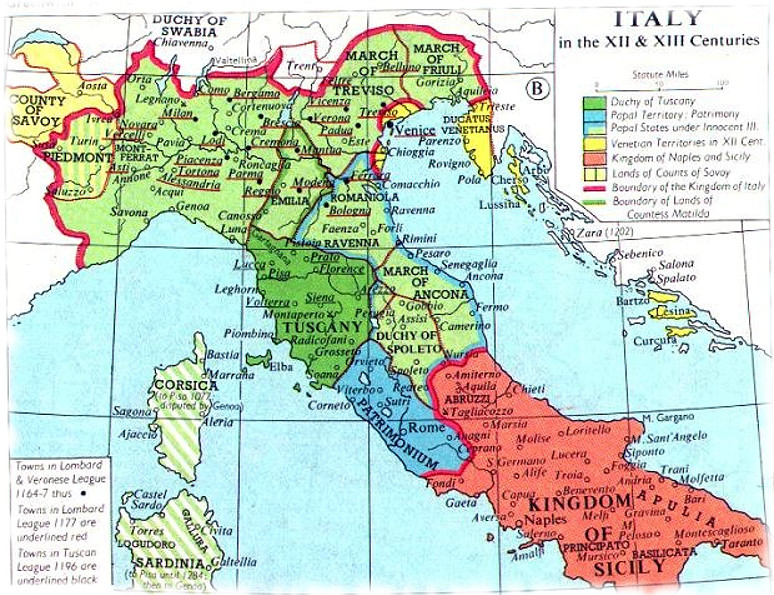Kingdom of Italy: Difference between revisions
No edit summary |
No edit summary |
||
| Line 3: | Line 3: | ||
<br> | <br> | ||
<br> | <br> | ||
== <span style="color:#800000;"> '''''Dark Medieval Italy''''' == | |||
By the middle of the 13th century, Italy is a geographical | |||
location and nothing more. Kinship comes from cities, | |||
which bloom under the pressure of constant immigration | |||
from the surrounding countryside, creating a new and complex layered society where both kine and Cainite thrive. | |||
As the towns become the centers of commerce, artisans, | |||
and traders group into guilds to protect their business from | |||
papal and imperial taxing, forming close-knit self-support | |||
networks which can be formidable foes – or excellent | |||
opportunities for the shrewdest of Cainites. Mimicking | |||
the human political structure and taking advantage of its | |||
independence, many ancillae have claimed their role as | |||
''primus inter pares'' in their city’s area, in open defiance of | |||
the larger power structures. | |||
=== The City-States === | |||
Taking advantage of the power struggle between the | |||
Pope and the Emperor, some of the largest cities have | |||
obtained their independence or act ''de facto'' as city-states | |||
in their own right, with their own laws, tribunals, and | |||
currency. One of the most popular solutions to deal with | |||
the litigious families and guilds is to appoint an external | |||
''podestà,'' a temporary ruler kept separate from the populace | |||
to guarantee their impartiality. As they stand at the apex | |||
of their might, some communes are starting to crack under | |||
the pressure of internal conflict, but the collapse brought | |||
by the Black Death is still to come. With famine and fear | |||
will also come the need for absolute rulers, transforming | |||
the ''podestà'' into ''signori'' and destroying the republican | |||
nature of the communes. | |||
Revision as of 14:48, 24 July 2017
Dark Medieval Italy
By the middle of the 13th century, Italy is a geographical location and nothing more. Kinship comes from cities, which bloom under the pressure of constant immigration from the surrounding countryside, creating a new and complex layered society where both kine and Cainite thrive. As the towns become the centers of commerce, artisans, and traders group into guilds to protect their business from papal and imperial taxing, forming close-knit self-support networks which can be formidable foes – or excellent opportunities for the shrewdest of Cainites. Mimicking the human political structure and taking advantage of its independence, many ancillae have claimed their role as primus inter pares in their city’s area, in open defiance of the larger power structures.
The City-States
Taking advantage of the power struggle between the Pope and the Emperor, some of the largest cities have obtained their independence or act de facto as city-states in their own right, with their own laws, tribunals, and currency. One of the most popular solutions to deal with the litigious families and guilds is to appoint an external podestà, a temporary ruler kept separate from the populace to guarantee their impartiality. As they stand at the apex of their might, some communes are starting to crack under the pressure of internal conflict, but the collapse brought by the Black Death is still to come. With famine and fear will also come the need for absolute rulers, transforming the podestà into signori and destroying the republican nature of the communes.
